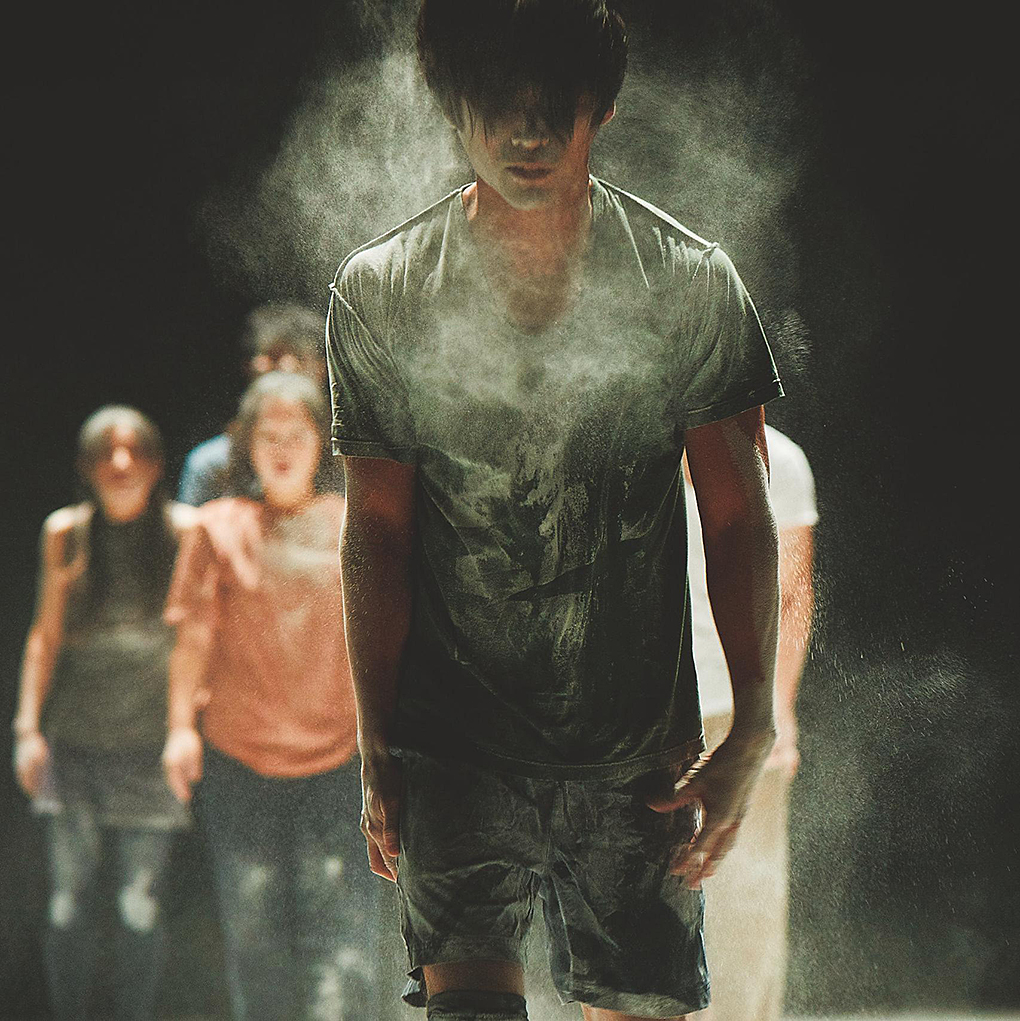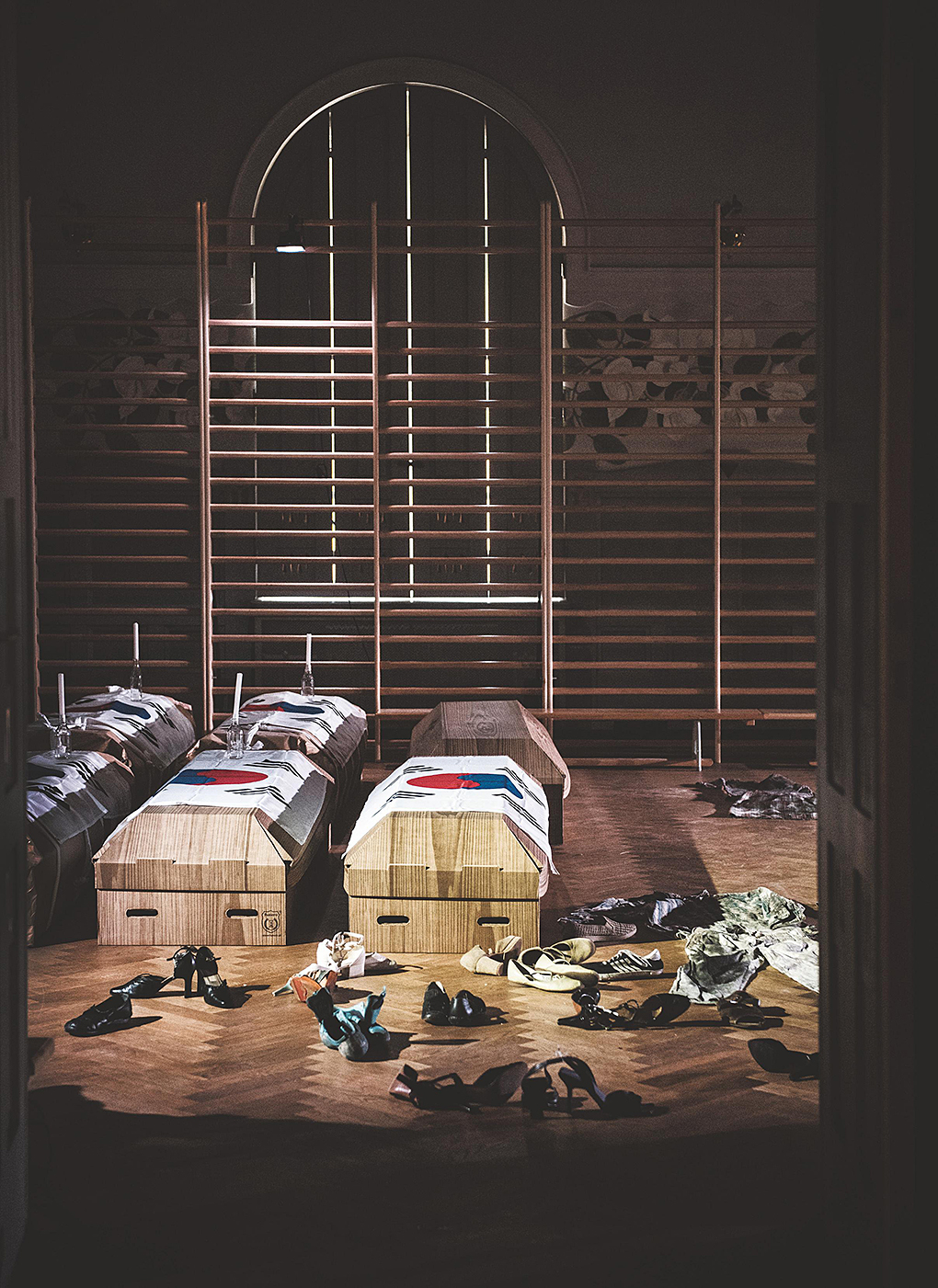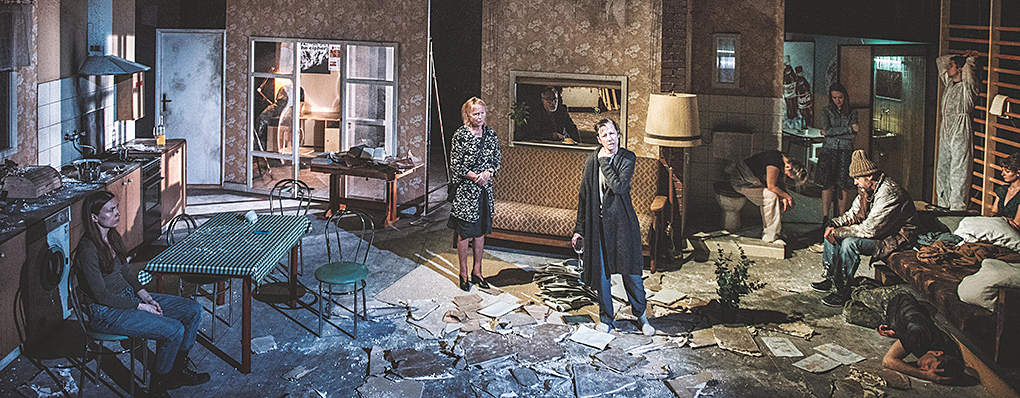Adapted from a novel about the Gwangju Democratic Uprising, two theatrical productions in Korea and Poland presented contrasting depictions of the bloody movement that still incites painful and contentious reactions decades later.
The Gwangju Democratic Uprising and the massacre of the city’s pro-democracy activists in May 1980 is a watershed moment in Korea’s political development. Today, “Gwangju” is without a doubt synonymous with the popular struggle against the iron-fisted rule of the nation’s postwar military regimes; the uprising continues to cast a long shadow in the Korean people’s collective public consciousness.
When we decided to produce a stage adaptation of the 2014 novel “The Boy is Coming” at the Namsan Arts Center, the sensitivity of the project was palpable. The book (English title: “Human Acts”) was written by Han Kang, recipient of the 2016 Man Booker International Prize. It paints a harrowing and poignant portrait of the ill-fated pro-democracy movement that unfolded in Gwangju and its aftermath. Born in Gwangju in 1970, Han remembers the bloodshed firsthand.
As the arts center prepared our adaptation, entitled “Human Fuga,” we learned another production was underway in Poland. Polish director Marcin Wierzchowski had read the very same novel and, deeply moved by it, had contacted the author about his plan to adapt it for the stage.
The scheduling of the two productions overlapped, so we agreed to eventually stage our plays in each other’s country. We believed that our two nations shared a common sentiment born from haunting pasts with which we are still grappling: Korea from the Gwangju Democratic Uprising (among others), and Poland from the Nazi concentration camp at Auschwitz during World War II. The Korean production team visited Poland in October 2019, and in November, the Polish team paid a return visit.

A scene from the play“Human Fuga” whichpremiered at the NamsanArts Center in Seoul inNovember 2019. Ratherthan reproducing thenarrative of the originalnovel, “The Boy isComing” (Human Acts)by Han Kang, bodylanguage, music andmise-en-scène conveyedthe hidden grief of thecharacters. / Photograph by Lee Seung-hui; Courtesy of Namsan Arts Center
A Longer Run-Up
Research and rehearsals for “Human Fuga” spanned 10 months, starting in January 2019. That was an unprecedentedly long time considering that Korean plays typically have a three-month preparation period before opening. This short turnaround was the case even when the Namsan Arts Center staged “Highway Number 7,” which revolved around Samsung semiconductor employees who were stricken with leukemia, and “From Pluto,” which marked the fifth anniversary of the 2014 Sewol ferry sinking that killed hundreds of students. Both dealt with subjects concerning unhealed emotional wounds that remain in Korean society.
We felt that simply reproducing the novel’s narrative would not pay appropriate homage to the historical significance of the uprising or the book itself. So we avoided the conventional route of explaining or acting out the story and delivering the narrative through dialogue. Instead, we focused on conveying the visceral pain and inner grief of the characters through the actors’ physicality – their restrained motions and vigorous movements akin to a dance.
“Fuga” (Italian for “fugue”) in the title refers to a compositional technique in music characterized by imitation or recurrence of a single theme. Thus, the play is structured to convey how the suffering caused by a single event is repeatedly manifested in various characters. As such, the dialogue may seem disconnected; the stories of different characters are delivered in a fragmentary style through their memories and testimonies. But this also allows the audience to feel and connect with the characters’ raw emotions.
The posters for “HumanFuga” (left) directed byBae Yo-sup and the Polishadaptation titled “The Boyis Coming” directed byMarcin Wierzchowski. The“Human Fuga” poster hasa bird’s-eye view pictureof the fountain in front ofthe South Jeolla provincialgovernment building inGwangju. The poster for “TheBoy is Coming” features animage of the 1980 GwangjuDemocratic Uprising recordedby photojournalistKim Nyung-man. / Courtesy of Namsan Arts Center
“Human Fuga” premiered at the Namsan

A scene from the first partof “The Boy is Coming” thatopened at the National StaryTheater in Krakow, Poland,in October 2019. It is arecreation of demonstrators’coffins placed in front ofthe provincial governmentbuilding in Gwangjuafter government troopskilled the activists. Unlike“Human Fuga,” the Polishplay faithfully renders thenarrative of the originalnovel. / Photograph by Magda Hueckel; Courtesy of National Stary Theater
Arts Center in November 2019. The play, co-produced with Performance Group TUIDA, received critical acclaim, with the International Association of Theatre Critics-Korea naming it one of the top three plays of the year. The association applauded it as “a masterly production that delves into a still unresolved, painful part of contemporary Korean history with a creative approach that encompasses drama, dance and installation art using the human body as a medium.”
The Polish adaptation titled “The Boy is Coming” is a five-hour play. The first part is based on the novel while the second part is set in Poland, telling the story of two families. Staged at the National Stary Theater in Krakow, which first opened in 1781, the play portrays each scene in the novel in meticulous detail, moving through eight different spaces within the theater.
Contrasting Approaches
Wierzchowski said that he was unaware of the Gwangju uprising until he encountered the novel, and that he wanted to draw the Polish public’s attention to state-inflicted violence. He wished to deliver the message that tragedy of this scale was not a historical event that was confined to Korea in 1980, but could happen anytime, anywhere, whether in Poland or somewhere else across the world. That is why he was committed to faithfully rendering the narrative of the original Korean novel, he said.
After watching “Human Fuga” during his visit to Seoul, Wierzchowski effused, “I was struck by a wondrous, extraordinary beauty,” and hugged director Bae Yo-sup. He also met with Korean audience members after the play, sharing with them an amusing account of how he discovered the novel: he was introduced to it by Amazon’s online shopping service. He went on to give his perspective of “The Boy is Coming,” and the audience showed particular interest in the stark difference in the directional approaches taken by the two troupes.However, the preparation process for the Korean and Polish production teams was fundamentally similar: both teams researched relevant materials and watched videos and movies on comparable incidents. It is likely that the two adaptations differed so much because of differences in the general theatrical direction that prevails in each country. Korean theater today tends to focus on the senses rather than on reenactment, and so the Korean production explored the emotions and thoughts of the characters. In contrast, the Polish play concentrated on the Gwangju uprising itself as an incident and how to convey its cruelty to the audience in greater detail.
The Koreanproduction explored
the emotions andthoughts of thecharacters.
Incontrast,
the Polishplay focused on theGwangju
uprisingitself as an incident
and how to convey itscruelty to the audiencein greater detail.

Part Two of “The Boy isComing” tells the storyof two Polish familiesliving in fear after agovernment massacreof citizens. / Photograph by Magda Hueckel; Courtesy of National Stary Theater
Exploring Hidden Truths
The entire run of “Human Fuga” from November 6-17, 2019 sold out and the production received rave reviews. But far more rewarding was the audience response: many people said that they had learned the truth about Gwangju, while survivors of the tragedy expressed their appreciation for keeping their story alive.
Indeed, there are still many unanswered guestions. When unidentified human remains were discovered at the former Gwangju Prison site in December 2019, a family member of a missing victim said in an interview, “I will dance if my son’s remains are recovered. Really. Then I will finally be able to let go of my grief.”
The victims and their families have remained trapped in time and place, continuing to relive the horror. And yet, they have been met with hostility from some corners of society who discredit their cause and their sacrifices. Gwangju is very much an ongoing trauma for many Koreans, with hidden truths yet to be uncovered.
In May of this year, which marks the 40th anniversary of the pro-democracy movement, “Human Fuga” and “The Boy is Coming” will be staged at the Namsan Arts Center in Seoul and the Bitgoeul Citizen Cultural Center in Gwangju. Then, in November, “Human Fuga” will travel to Poland. I believe these two theatrical productions, derived from the same novel, will continue to make a meaningful impact and resonate with even broader audiences in both countries.